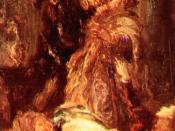Many great works of literature often focus on personal tragedy and ways of overcoming it. In Shakespeare's Hamlet, however, the inability of the main characters to confront their problems properly leads to the destruction of all. The antagonist of the play, Claudius, allows his personal ambition for power to overshadow the will of his conscience.
Hamlet opens at the royal castle of Elsinore where a ghost bearing the visage of the recently deceased King Hamlet is seen walking the halls in battle gear. Later it is learned that his brother, Claudius, has taken to the throne with King Hamlet's ex-wife, Gertrude, after only two months since the King's passing. The son of the deceased King, Hamlet, sees the marriage as a travesty stating, "(Oh God! A beast that wants discourse of reason would have mourned longer) married with my uncle; My father's brother, but no more like my father than I to Hercules."
(Shakespeare 13) Clearly, Hamlet sees the marriage as incestuous in the beginning ; but he doesn't take action until he is visited by the apparition of his father who
proclaims that Claudius killed him in lust for power. Hamlet is asked, "If thou didst ever thy dear father love - oh God - Revenge his foul and most unnatural murder." (27) Here begins Hamlet's quest to avenge his father by laying ruin to King Claudius. To be certain of the King's guilt, Hamlet puts on a play bearing a resemblance to how the ghost described the murder. When King Claudius views it, he feels a sudden pang of conscience and abruptly leaves. This flinch provides a first glance by the reader, and
Hamlet that Claudius is guilty and is at odds with himself for his foul actions.
From a soliloquy after storming out of the...



Nice
Good job... I actually just finished reading hamlet at school a week ago so I think it was a good essay... like maf said though, some of the sentences really could be cut dow... but anyways, good job.
6 out of 6 people found this comment useful.